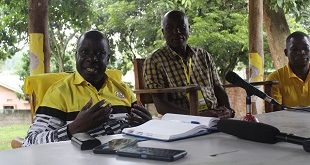
Kalisiiso , Uganda | THE INDEPENDENT | All seed secondary schools across the country will shortly be connected to the hydro-electric power line to support digital-based learning, the Minister for Energy and Mineral Development has committed.
Ruth Nankabirwa, the Minister for Energy and Mineral Development, revealed that as a priority, the cabinet has instructed the extension of hydropower lines to all secondary schools, including those still under construction.
According to the government education policy, a seed school is constructed in a sub-county without a public secondary school, as part of the considered strategic plan to support the effective implementation of the Uniserial Secondary Education-USE scheme in the country.
However, many seed schools, which were constructed under the World Bank-funded Inter-Government Fiscal Transfers-UgIFT program, are operating without reliable power connections because they are located far away from the electricity grid, which frustrates learning.
While addressing residents of Kalisiiso town council in Kyotera district, Nankabirwa assured that the schools are soon going to get relieved, because they have been prioritized in the next phase of expanding power connectivity.
She explains that the government recently obtained a USD 658 million loan from the World Bank and that a portion of the money has been committed to address hydroelectricity connectivity challenges in all seed secondary schools, Health Centers III and other essential public facilities across the country.
According to her, the Ministry is also moving to respond to the incomplete power projects left behind by previous electrification programs that were, for various reasons, either concluded or suspended before they could fulfil the underlying power demands.
Nankabirwa adds that over time, the country has built higher hydropower generation capacity, and the government is considering extending power lines to all parishes of the country, as a strategic move to promote production and agricultural value addition through the establishment of cottage industries.
He called upon communities to take advantage of the new hydropower infrastructure constructed in their areas, to connect their premises for their socio-economic transformation.
Hajji Ali Sseruyange, the Headteacher of Kiryasaaka Secondary School in Bukomansimbi district, prefers that the program is also extended to other non-seed public secondary schools that are not connected to electricity.
For instance, he explains that in 2021, the government supplied the school with 40 computer sets to support it in the implementation of the new secondary school curriculum which requires Computer Aided Learning-CAL, but the equipment is not utilized due to power connectivity.
******
URN
 The Independent Uganda: You get the Truth we Pay the Price
The Independent Uganda: You get the Truth we Pay the Price



